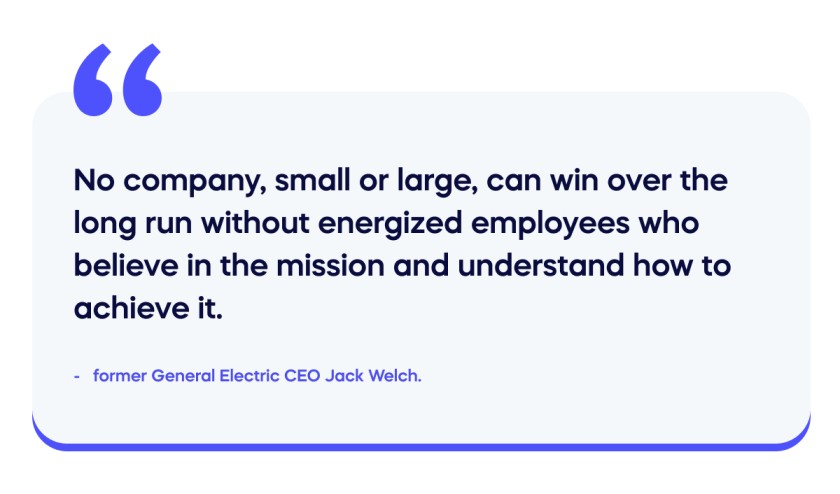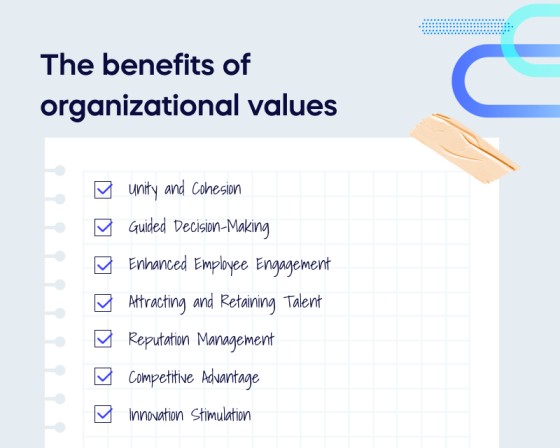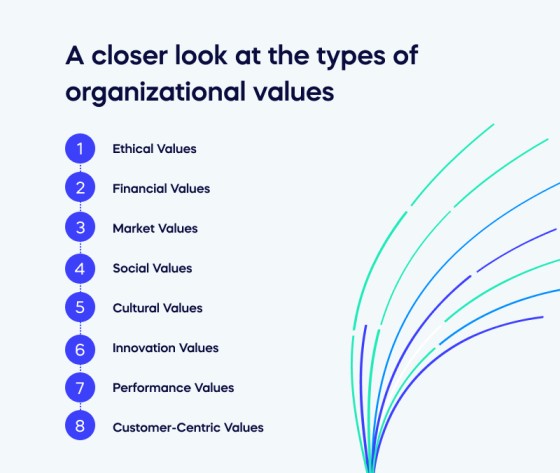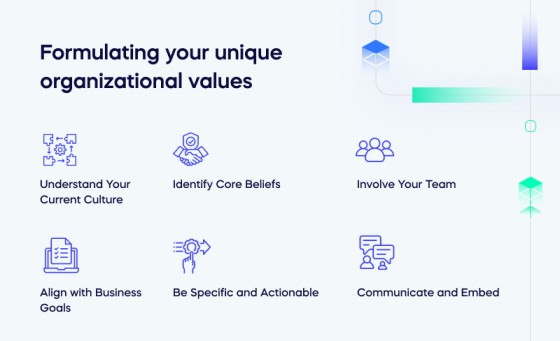Without organizational values, even the most resource-rich, “future-ready” organization increases its chances of facing potential drawbacks down the line.
Despite the benefits of digital transformation and the adoption of emerging tech solutions in accelerating business-critical processes, organizations that lack a guiding principle to direct their actions and decisions are like a ship sailing without a compass — unable to navigate effectively towards its desired destination.
According to Deloitte, 94% of executives and 88% of employees believe a distinct workplace culture is important to business success.

“No company, small or large, can win over the long run without energized employees who believe in the mission and understand how to achieve it.” — former General Electric CEO Jack Welch.
A company’s organizational values set a clear direction and guide every business decision, strategy, and action.
This article aims to help business leaders navigate the landscape of organizational values. We’ll start by defining what they are and outlining their importance before delving into their various types and the benefits they offer.
We’ll also provide advice that helps organizations shape their values, how to communicate them effectively, and bring theory to life with real-world examples. Ultimately, we hope to convey the importance of embodying these values to support organizational alignment, development, and growth.
What are organizational values?
Organizational values are the fundamental principles and beliefs that steer a company’s operation. They cultivate the corporate culture, dictate conduct, and set the tone for interpersonal interactions within the business, from customers and employees to senior stakeholders.
Research from Gallup shows that only 22% of employees feel that leaders have a clear direction for the organization.

As an ethical guide, these values encapsulate the company’s ethos and future goals. Essentially, they offer a sense of purpose and a strategic direction, assisting the organization in maneuvering through the intricate world of business.
It’s quite possible for an individual or group’s high affinity to certain values and beliefs to inspire and drive the creation of a business. This means that the values aren’t just an afterthought or a byproduct of the business; they are the foundation upon which the business is built.
The importance of organizational values
Organizational values guide employees’ actions and attitudes, fostering a shared understanding of what is important in the workplace. This creates a sense of unity and cohesion among team members, enhancing collaboration and productivity.
These values also influence the company’s approach to problem-solving and innovation. For instance, a business that values creativity will likely foster an environment where new ideas are encouraged and rewarded, driving continual improvement and growth.
From a macro business perspective, organizational values are important because they are key in shaping the business landscape and industry standards. They influence the competitive dynamics within an industry, defining what is considered acceptable or desirable behavior among competitors.
“Focusing on the long term may seem impossible in our unsettled times when many leaders are overwhelmed by the fallout of COVID-19 and scrambling just to manage day-to-day operations. Yet having a vision of the end goal is particularly important during a crisis—in fact, it may be the key factor that motivates managers and employees to keep going.” — McKinsey.
For instance, if a leading company in an industry prioritizes innovation as a value, it sets a standard that encourages other companies to invest in research and development to remain competitive. Similarly, a company that strongly values customer service can set consumer expectations for the entire industry, pushing other businesses to improve their service levels.
The benefits of organizational values

Now we’ve delved into the importance of organizational values, it’s equally important to understand their tangible benefits. These principles are not just abstract ideals; they have a real and profound impact on every facet of a business. They shape the culture, influence decision-making, and ultimately, determine success.
Let’s explore the top benefits companies can expect when instilling and upholding strong organizational values.
- Unity and Cohesion: Values unite employees under a shared purpose and vision, fostering teamwork and collaboration.
- Guided Decision-Making: They provide a framework for decision-making, ensuring consistency and alignment with the company’s mission.
- Enhanced Employee Engagement: When employees resonate with the company’s values, they are more likely to be engaged, motivated, and productive.
- Attracting and Retaining Talent: Companies with clear values attract like-minded individuals and are more likely to retain employees who align with these values.
- Reputation Management: Strong organizational values can enhance a company’s reputation, building trust with customers, partners, and other stakeholders.
- Competitive Advantage: Values can differentiate a company from its competitors, offering a unique selling proposition.
- Innovation Stimulation: When values such as creativity and innovation are promoted, it fosters an environment conducive to new ideas and continual improvement.
A closer look at the types of organizational values

Establishing strong organizational values requires an understanding of their diverse types. These values vary; each type impacts a company’s operations and culture. Below we’ll examine these different categories and their significance in an organization.
- Ethical Values: These relate to moral principles that guide actions, like honesty (truthful communication), integrity (acting consistently with principles), and fairness (equitable treatment of all).
- Financial Values: These relate to an organization’s financial goals and strategies. They include principles like fiscal responsibility, profitability, growth, or value creation for shareholders.
- Market Values: These are values that focus on an organization’s position within its market. They involve competitiveness, innovation, customer orientation, or adaptability to market changes.
- Social Values: These demonstrate a company’s societal responsibilities: diversity (inclusive practices), environmental sustainability (eco-friendly operations), and community engagement (active involvement in local communities).
- Cultural Values: These shape the company’s internal environment: teamwork (collaborative efforts), respect (valuing differences and rights of others), and communication (open and effective exchange of information).
- Innovation Values: These foster a creative climate: innovation (encouraging new ideas), agility (swift adaptation to changes), and risk-taking (embracing failure as a pathway to success).
- Performance Values: These drive business outcomes: excellence (striving for high standards), accountability (taking responsibility for actions), and results-orientation (focus on achieving goals).
- Customer-Centric Values: These ensure customer satisfaction: customer service (providing quality assistance), quality (delivering superior products/services), and value (offering practical solutions).
Formulating your unique organizational values

Formulating organizational values involves thoughtful introspection, collaboration, and alignment with the company’s mission. Here are some steps:
- Understand Your Current Culture: Assess the existing culture and values. This includes understanding what drives your team, what they value, and how they perceive the organization.
- Identify Core Beliefs: The leadership team should identify the core beliefs that drive their decisions and actions. These beliefs often form the basis of organizational values.
- Involve Your Team: Organizational values should not be top-down. Involve team members in brainstorming sessions to identify the values they believe in. This ensures buy-in from the team and makes the values more authentic.
- Align with Business Goals: The values should align with the organization’s strategic business goals. They should support the vision and mission of the organization.
- Be Specific and Actionable: Instead of generic values like ‘integrity’ or ‘innovation,’ go for more specific ones that indicate the expected behavior. For instance, ‘we believe in open and honest communication’ or ‘we encourage out-of-the-box thinking.’
- Communicate and Embed: Once the values are defined, they should be communicated to all employees and embedded in all aspects of the business – from hiring and onboarding to performance reviews.
Remember, organizational values should be more than just words on a wall. They should guide decision-making, influence behavior, and shape the organization’s culture.
Real-world examples of organizational values
In the following section, we’ll examine some noteworthy examples of organizations and how their core values have been diffused throughout their operations.
From sustainable practices and treating customers with respect to embracing adventure and having fun, these companies have leveraged their values to drive innovation and success. This is supported by research showing that 46% of job seekers cite company culture as very important when applying to a company.
- Microsoft: Microsoft’s values are centered around empowering every individual and organization across the globe to achieve their potential. They believe in creating a work environment that respects diversity, fosters collaboration, and operates with integrity and trust. With this approach, Microsoft has successfully innovated and delivered cutting-edge technology solutions while making meaningful contributions to society.
- Salesforce: Salesforce has built its company culture on a foundation of trust. Their values prioritize building trust with everyone they do business with – customers, employees, partners, and communities. This value has been successfully diffused throughout their organization, resulting in high customer satisfaction rates, more engaged employees, and a strong reputation as a trustworthy company.
- Apple: At Apple, their core values include innovation, design, and customer experience. They strive to create aesthetically pleasing, intuitive, and user-friendly products. These values have been successfully diffused throughout their company culture, leading to a strong brand identity that resonates with consumers.
- Google: Google’s core values include focusing on the user, speed, and doing the right thing. They prioritize delivering the best possible user experience by providing fast and reliable search results while adhering to ethical principles. These values have helped Google become one of the most successful tech companies in the world.
- JPMorgan Chase & Co.: JPMorgan Chase & Co.’s values prioritize integrity, excellence, and teamwork. They believe in conducting business ethically and transparently, providing high-quality financial services, and working collaboratively. These values have helped JPMorgan Chase & Co. build trust with its clients and set a standard of excellence within the finance industry.
Delivering on your organizational values
Identifying organizational values is the first step in creating a thriving company culture. The real challenge lies in implementing those values and ensuring they resonate across all levels of your organization.
One effective way to achieve this is by leading by example. A leader who models their values inspires employees to do the same. Leading by example means demonstrating to your employees that living up to your organizational values is not just a company policy but a personal philosophy.
“I don’t think you can create culture and develop core values during great times. I think it’s when the company faces adversity of extraordinary proportions, when there’s no reason for the company to survive when you’re looking at incredible odds — that’s when culture is developed, character is developed,” says Nvidia’s founder and CEO Jensen Huang.
Effective communication is another key component in diffusing organizational values. Highlight your values through success stories, recognize individuals who embody your values, and make sure to clearly and regularly reiterate your values with your employees.
By connecting with your employees on a deeper level and making them feel invested in your company’s values, you can create a culture where everyone is working together towards a shared vision. This fosters a sense of community and leads to increased loyalty and commitment to the organization.
When your employees are aligned with your organizational values, they are more likely to work harder, be more productive, and help drive the company’s success.

Frequently Asked Questions
Organizational values that prioritize innovation, transparency, and ethical considerations foster a culture receptive to AI integration, ensuring alignment with business objectives and enhancing stakeholder trust.
Alignment ensures that AI deployments support the organization’s mission and ethical standards, mitigating risks and promoting sustainable, purpose-driven innovation.
Organizations should reevaluate their core values at the onset of digital transformation to ensure they support agility, continuous learning, and innovation, which are essential for navigating technological changes.
Misalignment can lead to resistance and hinder transformation efforts. Addressing this requires deliberate cultural change initiatives to realign values with strategic objectives.

